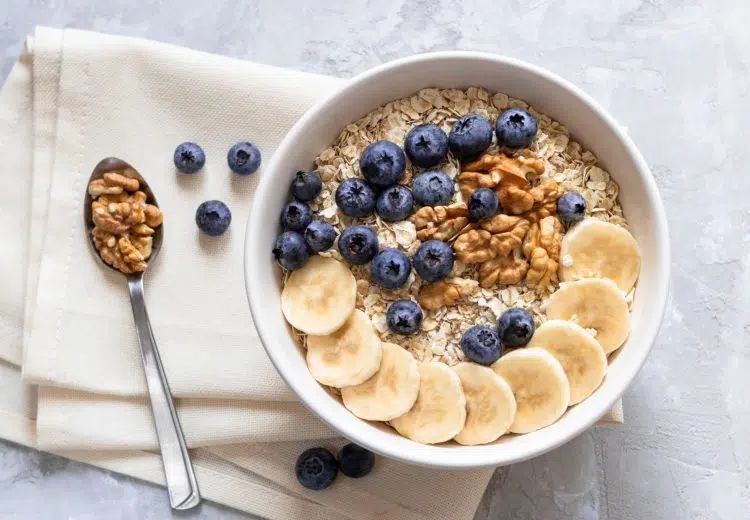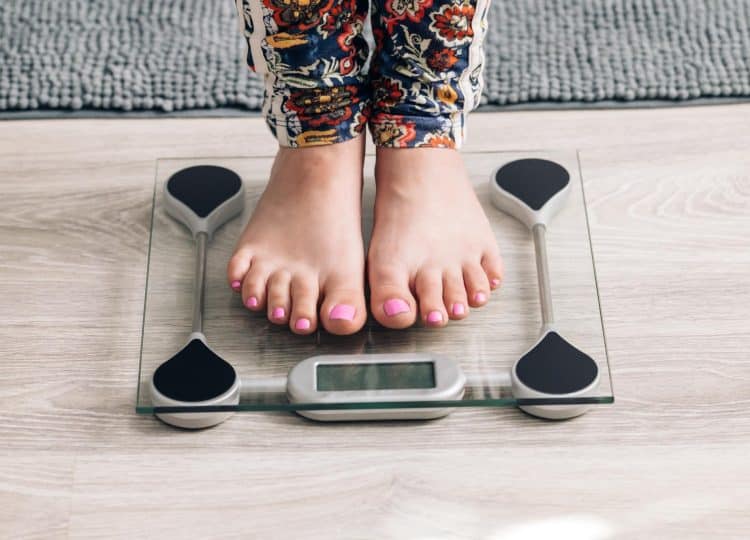According to the Centers for Disease Control (CDC), almost 50% of adults have tried to lose weight through dieting. Unfortunately, the CDC also states that only 11% are successful. The remaining 89% either fail to reach their goal weight or regain any weight lost in 12 months or less (1).
Such depressing statistics are enough to stop you from trying to lose weight.
However, the 11% must be doing something right, and an organization called the National Weight Control Registry (NWCR) has interviewed more than 10,000 dieters to find out what separates the successful from the unsuccessful (2).
I’m a veteran personal trainer and I’ve been helping people lose weight and keep it off for more than 30 years. Consequently, I’m always on the lookout for methods and habits that will improve my client’s chances of achieving their weight loss goals.
After all, if MY success rate was only 11%, I’d soon be out of work!
In this article, I share the top five science-backed habits of successful weight-losers.
Habit #1 – Always Eat Breakfast
Traditionally, it’s often said that breakfast is the most important meal of the day. However, more recently, a lot of people are skipping breakfast because they’re too busy in the morning to eat, or they’re following an intermittent fasting diet plan.
Some of those people who manage to eat breakfast fill their bellies with sugary cereals that are no better than junk food.
Still, according to the NWCR, 78% of successful dieters start each day with a healthy breakfast.
Eating a healthy breakfast has several proven weight loss benefits, including (3):
Improved Appetite Control – people who eat breakfast tend to experience less hunger during the rest of the day. This will make it much easier to stick to your diet.
Reduced Total Kilocalorie Intake – habitual breakfast eaters tend to consume fewer calories per day than those who frequently skip breakfast.
Increased likelihood of eating healthily – people who start the day with a good breakfast are more likely to eat healthily for the rest of the day. In contrast, those who skip breakfast or eat junk food in the morning are likelier to eat unhealthily.
But what constitutes a healthy breakfast?
Ideally, your breakfast should contain metabolism-boosting protein, energy-sustaining complex carbohydrates, and plenty of satiating fiber. Good options include:
- Eggs and wholemeal toast
- Oatmeal and a protein shake
- Overnight oats made with milk and Greek yogurt
- Homemade smoothies
Key Takeaway: Make time for a healthy breakfast to reduce your overall food intake and prevent hunger and cravings. A high-protein breakfast is especially helpful for weight loss. Avoid sugary cereals, which can trigger mid-morning hunger pangs and junk food cravings.
Habit #2 – Make Exercise Part of Your Daily Routine
Successful weight loss hinges on creating a kilocalorie deficit, which forces your body to burn stored body fat for fuel. Without this deficit, your body has no reason to dip into its energy reserves, and that means you won’t lose weight.
You can create a deficit by just eating less, but you can afford to eat more if you make exercise part of your lifestyle. Exercise burns kilocalories and can provide a significant contribution toward that all-important energy deficit.
So, while you can lose weight without exercise, doing so invariably means that your diet will have to be very strict. Regular workouts allow you to follow a more forgiving diet while still losing weight.
Based on the findings of the NWCR, a whopping 90% of successful dieters exercise for an hour or more most days of the week.
But what workouts are best for weight loss?
Contrary to what many people think, the truth is that it doesn’t really matter what exercise you do provided you are physically active most days of the week.
Sure, HIIT, circuits, and other high-intensity workouts burn more kilocalories per minute than less demanding types of exercise, but they also tend to be shorter. Subsequently, an hour of brisk walking can be as effective for weight loss as 30 minutes of circuit training.
Related: HIIT vs. LISS Cardio: Which One Is Best for Fitness and Fat Loss?
That said, you’ll maintain your muscle mass (and therefore, your metabolism) if you include strength training in your weight loss program. Lifting weights is also one of the best ways to improve insulin sensitivity and glucose tolerance, both of which help prevent fat storage.
Key Takeaway: Make regular exercise part of your lifestyle to lose weight and keep it off. Combine cardio, strength training, and plenty of walking so that you are physically active for at least an hour a day, seven days a week.
Habit #3 – Weigh Yourself at Least Once a Week
There is a saying in business that has since been adopted by the fitness industry, “You cannot manage what you do not measure.” Despite this, a lot of diet and nutrition experts warn against using the scales to track your weight loss progress.
But, according to the NWCR, 75% of successful dieters weigh themselves at least once a week.
While your weight can fluctuate from one day to the next, if your diet and workout program working, you should see a downward trend in your body weight over the coming weeks and months.
Tracking your weight allows you to see if your diet and exercise program are actually working. Consequently, you’ll be able to make adjustments if your progress is slow or stalls.
In addition, regular weigh-ins help keep you accountable. For example, if you’re tracking your weight, you’ll see how an unplanned cheat meal or week of missed workouts affects your progress. This evidence can often be enough to keep you on the straight and narrow weight loss path.
Seeing the numbers on the scale decrease over time can also be very motivating, reaffirming that what you are doing is paying off.
To make using the scales as useful as possible on your weight loss journey, you should:
- Weigh yourself at regular intervals, e.g., every Monday and Friday.
- Weigh yourself at the same time, e.g., on rising.
- Record your weight and look for long-term trends, ignoring short-term variations.
- Adjust your diet and exercise program according to your results.
- Combine your scale weight with other metrics, e.g., waist measurement or body fat percentage, to get a fuller picture of your progress.
Key Takeaway: Regular weigh-ins help to keep you accountable and reveal if your diet and exercise program is working. Ignore day-to-day weight fluctuations and, instead, look for weight loss trends.
Habit #4 – Watch Less Than 10 Hours of TV Per Week
A lot of people believe that they don’t have time to exercise or prepare healthy weight loss-friendly meals. However, when questioned, it turns out they spend several hours per day watching TV, surfing the internet, or otherwise enjoying some other form of passive entertainment.
Needless to say, all that time spent binging on Netflix or scrolling through Facebook could be used more constructively.
Watching TV invariably means sitting for extended periods and that puts your metabolism on a go-slow. Additionally, many people snack mindlessly while watching their favorite shows. This combination will derail almost any attempt to lose weight.
Based on the findings of the NWCR, 62% of successful dieters watch less than 10 hours of TV per week.
While I have nothing against watching TV and enjoy chilling out with my favorite shows most evenings. However, it’s safe to say that too much could hurt your weight loss progress.
That doesn’t mean you have to give up watching TV, but there are a few things that you can do that will prevent it from interfering with your weight loss efforts, such as:
- Limit the number of shows that you watch and avoid binge-watching multiple episodes back-to-back.
- Avoid eating your meals or snacking while watching TV as doing so makes it all too easy to consume more food than you realize.
- Seek out more active forms of entertainment. For example, go for a walk or try bowling instead in place of an evening in front of the TV.
- Break up long TV shows by getting up and moving around for a few minutes. A quick set of push-ups or squats, running up and down the stairs, or just walking to the kitchen to get some water will all help keep your metabolism speeding along nicely.
Habit #5 – Never Slip Up More Than Twice in a Row
When it comes to weight loss, consistency is the secret of success (4). You don’t need pills or potions or special foods; just eat less and move more to create the energy deficit that is essential for fat-burning and weight loss.
Provided your diet and exercise program are on point, weight loss should happen naturally. You just need to keep “punching the clock” and doing the work.
According to the NWCR, 79% of successful dieters maintain consistent diet and exercise programs and avoid extended breaks from their routines.
You WILL slip up from time to time – it’s inevitable – but where isolated slip-ups will have very little impact on your progress, several back-to-back slip-ups will.
Make sure you get back on track as soon as possible by never slipping up twice in a row.
So, if you miss Monday’s workout, make sure you hit the gym on Tuesday instead. Or, if you break your diet at lunchtime, get back on track for your very next snack and meal.
Don’t allow an unplanned treat to turn into a week-long junk food binge, or one missed workout to become a month off from the gym. This habit stops small slip-ups from turning into major progress-killing catastrophes.
Key Takeaway: Accept that slip-ups are part and parcel of losing weight. But, to prevent a minor mistake from turning into a major progress disrupter, make sure you never slip up twice in a row. Get back on track as soon as you can, ideally immediately after your diet or exercise indiscretion.
Closing Thoughts
The weight loss industry is failing you! Unsustainable eating plans, exhaustive workouts, and unrealistic expectations mean that only 11% of dieters ever achieve their weight loss goals.
The good news is that the habits that can help you lose weight and keep it off are straightforward and easy to incorporate into your chosen diet and exercise plan.
These habits include eating breakfast every day, exercising most days of the week, weighing yourself regularly, watching less TV, and not breaking your diet or exercise program more than twice in a row.
While these habits might seem inconsequential, they can be the difference between weight loss failure and success.
Put them into practice to become one of the 11% of people who successfully lose weight and keep it off.
References:
- Martin, C. B., Herrick, K. A., Sarafrazi, N., & Ogden, C. L. (2018). *Attempts to lose weight among adults in the United States, 2013–2016*. NCHS Data Brief, no. 313. Hyattsville, MD: National Center for Health Statistics. Retrieved January 8, 2025, from https://www.cdc.gov/nchs/products/databriefs/db313.htm
- National Weight Control Registry. (n.d.). *NWCR Facts*. Retrieved January 10, 2025, from http://www.nwcr.ws/Research/default.htm
- Leidy HJ, Ortinau LC, Douglas SM, Hoertel HA. Beneficial effects of a higher-protein breakfast on the appetitive, hormonal, and neural signals controlling energy intake regulation in overweight/obese, “breakfast-skipping,” late-adolescent girls. Am J Clin Nutr. 2013 Apr;97(4):677-88. doi: 10.3945/ajcn.112.053116. Epub 2013 Feb 27. PMID: 23446906; PMCID: PMC3718776.
- Schumacher LM, Thomas JG, Raynor HA, Rhodes RE, O’Leary KC, Wing RR, Bond DS. Relationship of Consistency in Timing of Exercise Performance and Exercise Levels Among Successful Weight Loss Maintainers. Obesity (Silver Spring). 2019 Aug;27(8):1285-1291. doi: 10.1002/oby.22535. Epub 2019 Jul 3. PMID: 31267674.
Tip: If you're signed in to Google, tap Follow.














